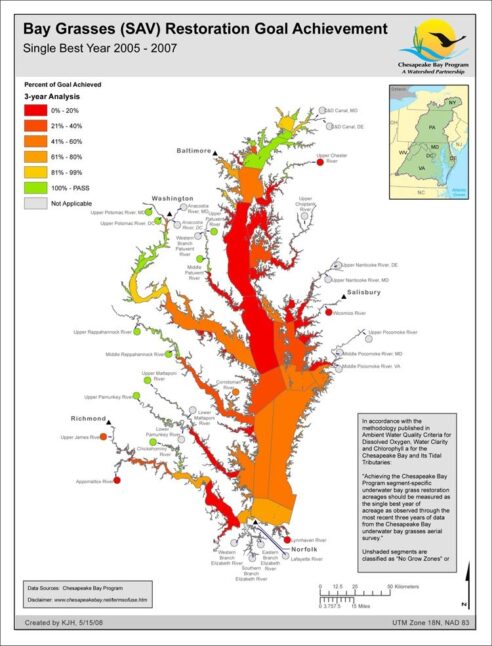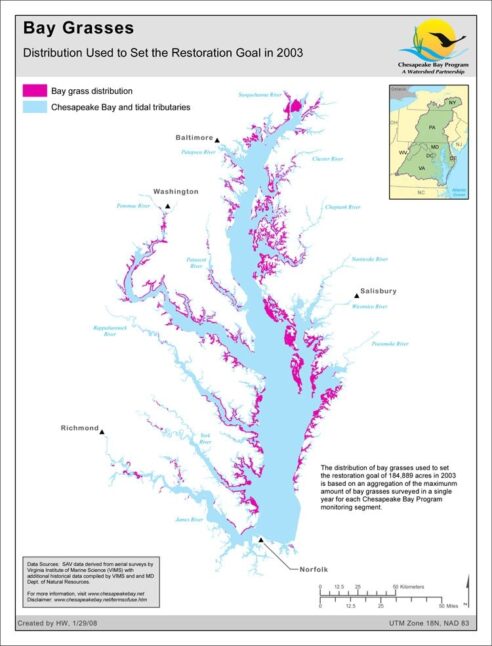Maps
Browse through maps depicting Bay health and restoration, including pollution trends, public access sites and more.
Bay Grasses (SAV) Restoration Goal Achievement: Single Best Year 2011-2013
Date created: April 3, 2014This map shows progress toward achieving the Chesapeake Bay Program segment-specific underwater bay grass restoration goals. It is based on the single best year of acreage as observed through the most recent three years of data from the Chesapeake Bay underwater bay grasses aerial survey.
View mapBay Grasses (SAV) Restoration Goal Achievement: Single Best Year 2010-2012
Date created: April 17, 2013This map shows progress toward achieving the Chesapeake Bay Program segment-specific underwater bay grass restoration goals. It is based on the single best year of acreage as observed through the most recent three years of data from the Chesapeake Bay underwater bay grasses aerial survey.
View mapBay Grasses Planted (2011)
Date created: May 11, 2012In 2003, the CBP adopted the Strategy to Accelerate the Protection and Restoration of Submerged Aquatic Vegetation in the Chesapeake Bay including a commitment to plant 1,000 acres by 2008. The program partners have thus far planted 17% of their initial goal. In 2011, 0.02 acres were planted. Both funding for SAV planting, and capacity for doing it, will need to be increased dramatically to meet the goal on time.
View mapBay Grasses (SAV) Restoration Goal Achievement: Single Best Year 2009-2011
Date created: March 26, 2012This map shows progress toward achieving the Chesapeake Bay Program segment-specific underwater bay grass restoration goals. It is based on the single best year of acreage as observed through the most recent three years of data from the Chesapeake Bay underwater bay grasses aerial survey.
View mapBay Grasses (SAV) Restoration Goal Achievement: Single Best Year 2008-2010
Date created: March 4, 2011This map shows progress toward achieving the Chesapeake Bay Program segment-specific underwater bay grass restoration goals. It is based on the single best year of acreage as observed through the most recent three years of data from the Chesapeake Bay underwater bay grasses aerial survey.
View mapBay Grasses (SAV) Restoration Goal Achievement: Single Best Year 2007-2009
Date created: March 8, 2010This map shows progress toward achieving the Chesapeake Bay Program segment-specific underwater bay grass restoration goals. It is based on the single best year of acreage as observed through the most recent three years of data from the Chesapeake Bay underwater bay grasses aerial survey.
View mapBay Grasses (SAV) Restoration Goal Achievement: Single Best Year 2006-2008
Date created: March 24, 2009This map shows progress toward achieving the Chesapeake Bay Program segment-specific underwater bay grass restoration goals. It is based on the single best year of acreage as observed through the most recent three years of data from the Chesapeake Bay underwater bay grasses aerial survey.
View mapBay Grasses (SAV) Restoration Goal Achievement: Single Best Year 2005-2007
Date created: May 15, 2008This map shows progress toward achieving the Chesapeake Bay Program segment-specific underwater bay grass restoration goals. It is based on the single best year of acreage as observed through the most recent three years of data from the Chesapeake Bay underwater bay grasses aerial survey.
View map
Bay Grasses - Distribution Used to Set the Restoration Goal in 2003
Date created: January 29, 2008This map shows the historic distribution of bay grasses that was used in 2003 to set the Chesapeake Bay Program SAV (or bay grass) restoration goal of 184,899 acres. This goal is based on an aggregation of the maximum amount of SAV surveyed in a single year for each Bay Program monitoring segment. Bay grasses are a vital part of the Chesapeake Bay ecosystem. They provide habitat for crabs and juvenile fish and food for waterfowl. Bay grasses grow mostly in waters that are 2 meters in depth or less and are negatively affected by poor water clarity.
View map
